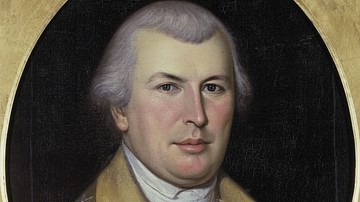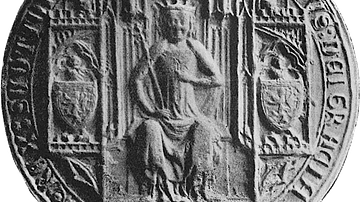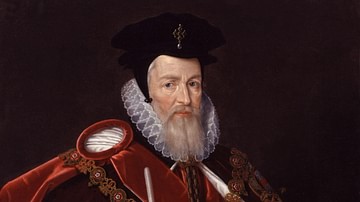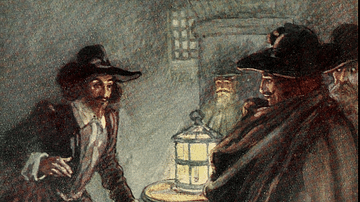The Elizabethan era is often regarded as a golden age for English culture, language, and literature. Though William Shakespeare, Christopher Marlowe, Ben Jonson, and Edmund Spenser are amongst the best remembered writers of this era, many other poets, playwrights, and dramatists helped to forge this literary golden age. This article examines four lesser-known Elizabethan playwrights and poets.

John Lyly
Amongst the first of the great Elizabethan dramatists was John Lyly (c. 1553/54-1606), whose popularity reached its peak in the days before Shakespeare and Marlowe. Born in Kent, England, in either 1553 or 1554, he graduated from both Oxford and Cambridge, earning him a place amongst the group of well-educated late 16th-century English poets referred to by literary scholars as the 'University Wits'. Lyly was not a particularly gifted student – indeed, the antiquarian Anthony Wood notes that his genius was "naturally bent to the pleasant paths of poetry" rather than those of academics. Shortly after leaving Oxford, Lyly finished his first work, a prose romance entitled Euphues: The Anatomy of Wit (1578). It was an instant bestseller, undergoing four editions within its first year, and was quickly followed by a second part, Euphues and His England (1580).
These works were, according to scholar Stanley Wells, "short on narrative, but rich in dialogue, argument, and debate" and had a "colossal, if brief, impact on the development of English prose" (63). Here, Wells refers to the prose style with which Lyly writes, called 'euphuism', which involves an "unremitting use of alliteration, antitheses, puns, carefully balanced clauses, similes derived from natural history, and many other rhetorical figures of speech" (Wells, 64). This kind of writing was lighter and more elegant than Elizabethan audiences were used to reading and quickly became fashionable, later influencing the works of Robert Greene and Shakespeare.
After his almost overnight success, Lyly turned to writing comedies. With the patronage of Edward de Vere, 17th Earl of Oxford – a poem-loving aristocrat sometimes thought to be the true author behind Shakespeare's works – Lyly leased the first Blackfriars Playhouse in 1583. His first two plays, Campaspe and Sapho and Phao, were performed here the following year by the Children of Paul's, a troupe of boy actors favored by Elizabeth I of England. Throughout the 1580s and '90s, Lyly would continue to write plays – the most significant of these is his 1588 comedy Endymion, which was written in his trademark euphuistic style and contains multiple references to ancient myths and traditional English folklore. Indeed, all of Lyly's plays are characterized by mythological references as well as light and witty dialogue, leading him to be considered the first of the Elizabethan playwrights to write in "plain English". His style influenced the next batch of playwrights who would quickly eclipse him in fame; by the late 1580s, writers like Christopher Marlowe and Thomas Kyd had taken Lyly's place in Elizabethan theatre. As his influence faded, Lyly focused less on playwrighting and more on his political career. Having sporadically sat in Parliament since 1580, he now coveted the position of Master of the Revels, an office that was continually denied to him. Frustrated, he wrote the queen a despairing letter in 1593, begging her to remember his years of service:
Thirteen years your Highness' servant, and yet nothing; twenty friends that though they say will be sure, I find them sure to be slow; a thousand hopes, but all nothing; a hundred promises, but yet nothing. Thus casting up the inventory of my friends, hopes, promises, and time the summa totalis amounteth in all to just nothing.
(Wells, 66)
Lyly died in 1606, never having achieved his dream of becoming Master of the Revels. Like many of his contemporaries, his memory rests within Shakespeare's long shadow, although his influence looms large in the Bard of Avon's work; indeed, Shakespeare's plays Twelfth Night and Much Ado About Nothing are stylistically similar to Lyly's work, a fact that would have been recognized and appreciated by Elizabethan audiences. One example of Lyly's poetry is Oh, For a Bowl of Fat Canary:
Oh, for a bowl of fat Canary,
Rich Palermo, sparkling Sherry,
Some nectar else, from Juno's dairy;
Oh, these draughts would make us merry!
Oh, for a wench (I deal in faces,And in other daintier things);
Tickled am I with her embraces,
Fine dancing in such fairy rings.
Oh, for a plump fat leg of mutton,Veal, lamb, capon, pig, and coney;
None is happy but a glutton,
None an ass but who wants money.
Wines indeed and girls are good,But brave victuals feast the blood;
For wenches, wine, and lusty cheer,
Jove would leap down to surfeit here.
Robert Greene
Another of the so-called 'University Wits' was Robert Greene (c. 1558-1592), who is sometimes considered England's first professional writer. Probably born in Norwich, England, on 11 July 1558, Greene studied at both Cambridge and Oxford before moving to London in 1583. He was a prolific writer, penning around 25 works of prose over the course of his short, twelve-year career. The cost of maintaining such a rapid output was that the quality of his work often fluctuated – indeed, his need to constantly pump out works meant that Greene sometimes engaged in something akin to what we would today call plagiarism. According to Wells, "Greene was himself an unscrupulous thief of other men's wit, and indeed of his own, since he repeatedly transfers whole paragraphs and more from one work to another" (67). This classification would hardly have bothered Greene, who was more interested in fame than artistic integrity. At a time when writing as a profession was still largely untrodden ground and many playwrights were forced to turn to aristocratic patrons for support, Greene certainly needed to be prolific in order to forge his reputation and career path.

Initially, Greene drew inspiration from Lyly's Euphues works before moving on to write prose pastorals in the style of Sir Philip Sidney's Arcadia – the most popular of Greene's pastorals was Pandosto (1588), best remembered today as the direct inspiration for Shakespeare's The Winter's Tale. Greene's poems and romances quickly became popular with Elizabethans, who were becoming increasingly literate, and although fellow poet Thomas Nashe accused Greene of "yarking up" his pamphlets "in a night and a day", these pamphlets nevertheless proved quite popular as well (Wells, 68). One area where Greene truly shines is his plays; Wells writes that "the best of his plays show a lively imagination, mastery of dialogue in both prose and verse, and an original talent for dramatic construction" (ibid). His plays – mostly romantic comedies – were largely written between 1588 and 1592 and include The Scottish History of James the Fourth and The Honorable History of Friar Bacon and Friar Bongay. These plays seem to have paved the way for future romantic comedies, such as the ones that Shakespeare would soon write.
Greene is remembered as much for his bohemian and debaucherous lifestyle as he is for his work. He was closely involved with the underground society of London, and many of his most popular pamphlets were semi-autobiographical accounts of his dealings with the city's petty criminals; these 'coney-catching' pamphlets ('coney' here referring to a rabbit) detail how unsuspecting visitors from the countryside would be preyed upon by pickpockets and other thieves. Greene lived recklessly and had at least one bastard son with his mistress, a boy named Fortunatus, who would die in childhood only a year after Greene. Greene himself died on 3 September 1592 after a lingering illness – never one to shy away from spending the money he made, Greene had slipped into poverty around the time of his death and was living with a shoemaker named Isam. His last known letter, written the day before he died, was to his estranged wife, asking her to pay Isam the money he owed him:
Sweet wife, as ever there was any good will or friendship between thee and me see this bearer, my host, satisfied of his debt. I owe him ten pound, and but for him I had perished in the streets. Forget and forgive my wrongs done unto thee, and almighty God have mercy on my soul. Farewell till we meet in heaven, for on earth thou shalt never see me more. This 2 of September 1592, written by the dying hand of Robert Greene.
(Wells, 69)
Shortly after Greene's death, his final pamphlet entitled Green's Groats-Worth of Wit was published. Though the true authorship of this pamphlet is debated – some scholars argue that the author was actually Henry Chettle – the pamphlet proports to be an autobiographical morality tale. It is primarily of interest today because it seems to contain criticism of Shakespeare, who was then early on in his career. Greene – or Chettle – attacks Shakespeare as "an upstart crow, beautified with our feathers, that with his tiger's heart wrapped in a player's hide supposes he is well able to bombast out a blank verse as the best of you: and being an absolute Johannes fac totum [i.e., 'Jack of all Trades'], is in his own conceit the only Shake-scene in a country" (quoted in Wells, 66). This quotation is suspected to be about Shakespeare because it references a famous line from Henry VI, Part Three: "O tiger's heart wrapped in a woman's hide!" (1.4.138). An example of Greene's poetry is his Sephestia's Song to Her Childe from his work Menaphon:
Weep not my wanton! Smile upon my knee!
When thou art old, there's grief enough for thee.
Mothers wag, pretty boy,
Father's sorrow, father's joy.
When thy father first did see
Such a boy by him and me,
He was glad, I was woe:
Fortune changed made him so,
When he left his pretty boy,
Last his sorrow, first his joy.
George Peele
Much like Greene, George Peele (1556-1596) was a 'University Wit' with a penchant for fast living. Born on 25 July 1556 in London, his father was a clerk and teacher of bookkeeping – indeed, his father wrote several textbooks on accounting and also wrote several pageants for the city of London. In 1571, Peele went to Oxford at the age of 14, living close to where several other prominent poets, including Lyly, were residing during the same period. He earned his M.A. in 1579, and the next year, he married 16-year-old Ann Cooke, who had recently come into a large sum of money after the death of her father. The newlywed couple were prevented from accessing this inheritance due to a lawsuit that would occupy them for many years. Peele moved to London in 1581, and though he constantly had to travel back and forth to Oxford to deal with legal matters, he somehow found time to write; his pastoral comedy play The Arraignment of Paris was finished in 1581 and was likely first performed that same year.

This play – written, as Wells notes, before "either Marlowe or Shakespeare had made his mark" (70) – retells the story of Paris from Greek mythology, who was tasked with awarding the golden apple to whichever of the goddesses (Hera, Athena, or Aphrodite) he thought the fairest. Peele, who was also a translator of the Greek language, would have been intimately familiar with such stories, which also provided the source for his earliest non-dramatic work, The Tale of Troy (1589). From the late 1580s to early '90s, he published several more works including the comedy The Old Wife's Tale (c. 1591), the history play Edward I (c. 1592), and the history play The Troublesome Reign of King John (c. 1589), which is thought to have inspired Shakespeare's own play on the subject, King John (c. 1596). Peele is thought to not only have known Shakespeare but also have worked with him; many modern scholars accept that he co-wrote Shakespeare's revenge play Titus Andronicus (c. 1594), although there is no concrete evidence of this. Peele died in November 1596 'of a pox' at the relatively young age of 40. An example of his poetry is Hot Sun, Cool Fire from his play David and Bethsabe:
Hot sun, cool fire, tempered with sweet air,
Black shade, fair nurse, shadow my white hair.
Shine sun, burn fire, breathe air, and ease me;
Black shade, fair nurse, shroud me and please me.
Shadow, my sweet nurse, keep me from burning;
Make not my glad cause cause of mourning.
Let not my beauty's fire
Inflame unstaid desire,
Nor pierce any bright eye
That wandereth lightly.
Chidiock Tichborne
Chidiock Tichborne (1558-1586) was not a prolific nor particularly influential poet by any means, but his circumstance – and the popularity of his Elegy – earns him a spot on this list. He was born in Southampton, England, in 1558, to a family of devout Roman Catholics. For much of his childhood, the Protestant government of Queen Elizabeth I tolerated Catholicism, allowing families like Tichborne's to practice their faith – that was until 1570, when the queen was excommunicated by the pope, leading her to retaliate with several anti-Catholic measures. Roman Catholicism once again became illegal throughout her realm, and Catholic priests were barred from performing their functions on pain of death. In 1583, Tichborne and his father Peter were arrested by English authorities and questioned over the "popish relics" they had brought back from a recent trip abroad. Though they were ultimately released, the family was still routinely questioned about its faith and was again accused of "popish practices" in the summer of 1586.
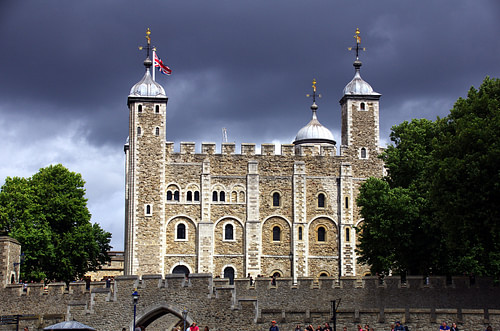
This religious persecution clearly affected Tichborne, who joined in the Babington Plot, a conspiracy to assassinate Queen Elizabeth so that the Catholic Mary, Queen of Scots could ascend the English throne. The plot was uncovered by double agents loyal to the queen, and though some of the conspirators fled before they could be apprehended, Tichborne was unable to leave London due to an injured leg. He was arrested on 14 August 1586, sentenced to death, and imprisoned in the Tower of London to await his execution. According to tradition, on 19 September – the night before his execution – he wrote a letter to his wife Agnes, a three-stanza poem that has become immortalized as Tichborne's Elegy. The poem gives the reader a glimpse into the mind of a man awaiting his certain death, in which Tichborne laments that he must die while still a young man – he was only 28. On 20 September 1586, Tichborne and six co-conspirators were hanged, drawn, and quartered. Their deaths were so gruesome that many Londoners expressed sympathy for them, leading Queen Elizabeth to commute the sentences of the seven remaining conspirators to a simple death by hanging. Tichborne's Elegy, first printed in the year of his death, was easily his most notable work, becoming one of the most popular poems for contemporary Elizabethans who commonly put it to music:
My prime of youth is but a frost of cares,
My feast of joy is but a dish of pain,
My crop of corn is but a field of tares,
And all my good is but vain hope of gain;
The day is past, and yet I saw no sun,
And now I live, and now my life is done.
My tale was heard and yet it was not told,My fruit is fallen and yet my leaves are green,
My youth is spent and yet I am not old,
I saw the world and yet I was not seen;
My thread is cut and yet it is not spun,
And now I live, and now my life is done.
I sought my death and found it in my womb,I looked for life and saw it was a shade,
I trod the earth and knew it was my tomb,
And now I die, and now I was but made;
My glass is full, and now my glass is run,
And now I live, and now my life is done.


